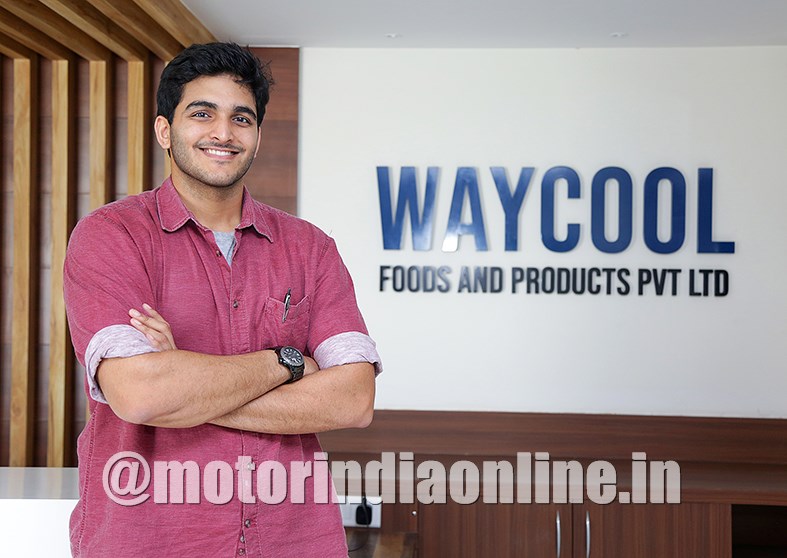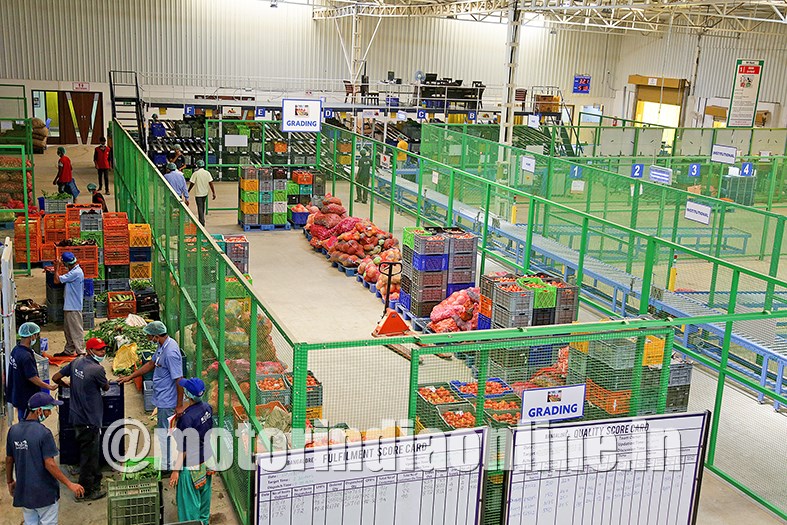In cinematic language, the ‘underdog’ is one who is cheered on by the viewers in his travails to rise above them and ultimately win. And precisely that is what makes Muniraj a credible protagonist.
He is but one such hero among the 35,000 small farmers across south India that WayCool Foods & Products engages with.

As an exporter of flowers once, Muniraj made huge losses was facing a bleak future. But his meeting with WayCool’s Co-Founder helped him convert his small plot into a collection centre for the agricultural produce of his fellow small farmers and his business took off. He started earning a respectable Rs. 50 lakhs a month. The key to life’s turnabout lay in the business model of WayCool that he agreed to take up.
Redefining ‘Farm to Fork’ Concept
WayCool Foods & Products since then has replicated the business model in multiple locations in south India. A start up born in 2015 with 10 angel investors providing the seed money, WayCool’s founders – all, including his father, experienced professionals of the automotive industry – wanted to standardize the food supply chain in India by making it professional, automated, traceable and delivering quality.
The ‘face’ of the company, Co-Founder, Mr. Sanjay Venkat Dasari, takes care of the entire front-end operations including the top line growth, brand building, creation and management of distribution channels, merchandising, marketing among others. This 24-year-old graduate from the Babson College of Entrepreneurship, Boston, specializing in Finance and Strategic Management reiterates WayCool’s commitment to delivering ‘on time in full’ to its customers.
A self-proclaimed ‘foodie’, Mr. Dasari initially explored being an entrepreneur in the food space. Instead he zeroed in on the supply chain management of it. And to his slight disappointment, one of the first people he met at the vegetable ‘mandi’ was matter-of-fact and considered ‘a carrot is a carrot’. But for Mr. Dasari, there lay many nuances to the simple vegetable in terms of its origin, the farmer who grew it, the growth process and the pesticide use, the soil strength among many other aspects going up to the end customer. From then on, he – along with other co-founders – decided that WayCool will redefine the concept of ‘farm to fork’ in more than one way.
Mr. Dasari shares: “From early on we were driven to fix the broken food supply chain in India. As we began working and started scaling up the business, we understood that the problem lay at the root level which is the farmer. And so we began to work in earnest to set it right.”
Mr. Dasari paints a verbal picture of how the vegetable is tracked – starting from the farmer somewhere in Ooty: “In winters, when carrot ‘halwa’ is in season, a restaurant-customer of ours once wanted a specific type of carrot. We sourced and delivered the variety and they were ecstatic. Predicting the pattern, we tracked the farmer and suggested to him to grow carrots in about three-quarters of his two-acre plot.”
‘Fixing’ The Food Supply Chain
WayCool works with three categories of customers – hotels, restaurants and hospitals coming under the ‘food category’, the modern trade that includes large super markets, and chains; and, general traders including the local small retailers. It has distribution centres present one each in Bangalore and Hyderabad, two in Chennai while one is coming up in Coimbatore.
According to Mr. Dasari: “WayCool’s strong supply chain works across many farmers and a range of product categories to 8,000 customers in cities efficiently, hygienically, using economical transportation. We believe that being present in fewer cities doing maximum business is better. Our market share in each city is 2-3 per cent. There are over a couple of thousand small players in each city doing similar business but all of them have only a couple of SKUs while we have a whole range. We began at about 50 kgs. Today we deliver about 250 tonnes in four years’ time. Our aim is to be one of the top most players in the city we deliver in.”
In 2017, WayCool found financial backing from a social impact agro-tech company to the tune of $2.7 million. Then earlier this year, it further received $20 million from an investment firm that works on social impact investment in the segment that WayCool works in and for which it is audited every year on the social impact that they generate.
With a 20 per cent growth rate month on month, WayCool reports approximately Rs. 13 crores revenue every month. Of this, 40 per cent each is contributed by food groups such as fresh fruits and vegetables and staples like rice, pulses, and refined flour; 10 per cent comes from dairy while the balance 10 per cent comes from branded products.
Because Data Rules The Roost
As a B2B company, WayCool has achieved an average of 95-98 per cent of the fill rate – a metric that is used to measure the depth of demand fulfilled by the inventory at hand.
The sustainable idea of working as a social impact company – focusing on increasing farmer income – has helped WayCool achieve this milestone. Mr. Dasari says: “We work only with the small, marginal farmers who have two acres or less. We offer them mentorship and our guaranteed purchase yet they have the option to sell to others if they get better price. Unlike the traditional method of dumping produce with a local transporter without the promise of returns or the amount of it, we send our truck with a weighing machine to weigh on site, at a price discussed over the phone beforehand.”
Mr. Dasari insists that human bias and malpractices which plague the traditional supply chain are eliminated at WayCool due its extensive and in-depth use of data.
“We offer a business opportunity to the farmer where we subsidize his CapEx by 50 per cent. In fact, the local farmer can become a collection centre partner too. That way, we control the farming collection, be in direct touch with the farmer who has grown the vegetable and the quality and the quantity he offers. We also become aware of how much the collection person is paying the farmer because he operates on our IT system. And we control the manpower for grading inside the collection centre too.”
In the making for the last three and a half years, WayCool’s software can forecast a customer’s demand down to 99 per cent accuracy three weeks earlier. Mr. Dasari explains: “The customers tell us the quantity 15 hours before. We can manage easily because we plan our demand three months ahead and therefore, we can advise our farmers what to grow. We try to map a certain farmer to a certain city’s consumption. That way, if he chooses to sell it to WayCool, then there is guarantee on quality because we know his practices, and the seeds being used.”
WayCool aims to bring out an app where the customer can feed his information in easy steps.
Team WayCool
Currently, WayCool is 1,000-employee strong with seven warehouses across four cities. They help set up and work with FPOs or Farmer Producer Organisations in the villages too and till date has worked with around 35 FPOs where each FPO has roughly 1,000 farmers. The company also has signed MoUs with the Governments of Andhra Pradesh and Maharashtra, and with M.S. Swaminathan Research Foundation and the National Agro Foundation.
Talking about their program called Outgrow, Mr. Dasari shares: “We suggest sustainable business model called staggered cultivation where even a small farmer can enjoy steady flow of income by cultivating several vegetables instead of one on his entire plot and earn income only once when he sells it.”
Even if the quantity is less, WayCool guarantees to buy the entire produce and pays the farmer digitally.
Tracking Quality – The Tasty Way
WayCool is developing a system called Rapid S2S (Seed to Sale) to trace the seed quality, its sourcing, ASNS or Advance Shipping Notice at Source, auto-inwarding and auto-allocation. But it all starts with basic visual check at the farm itself followed by checking at the collection centres for size and shape as sought by the customers.
Mr. Dasari shares: “If a vegetable is not up to the mark, we can trace it back to the farmer, the geographical location, and even the fertilizer used. Soon Rapid S2S can trace the seed variety used, the temperature, the date and the time the vegetable reached our distribution centre, and the feedback by the quality controller of that SKU. This is unique, especially in the food space, as far as we know both in India and elsewhere.”
And that is why farmers like Muniraj are being respected that is due to them, and in turn, it keeps WayCool prompt on delivering on time in full always to its customers.
